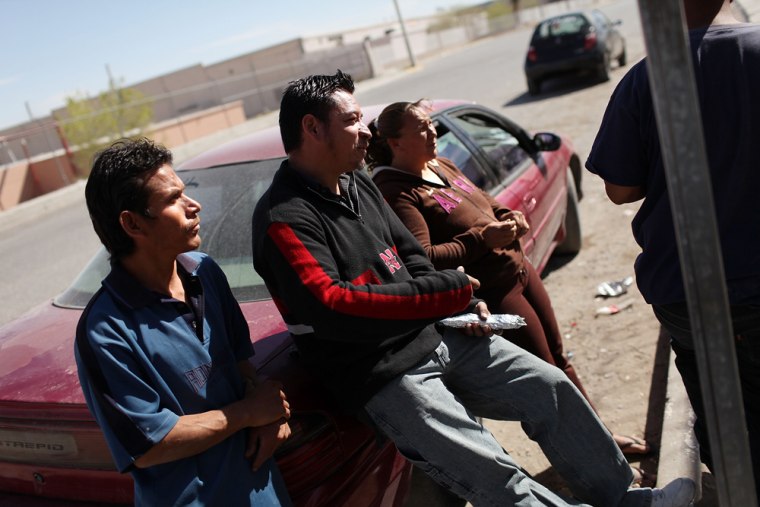A cast of senior U.S. security officials pledged long-term support for Mexico's drug war while acknowledging Tuesday that an insatiable U.S. appetite for illegal narcotics, coupled with a flow of U.S. arms into Mexico, is at the core of the problem.
Secretary of State Hillary Rodham Clinton, who led the U.S. delegation at a daylong meeting with top Mexican government officials, told a news conference afterward that Washington must do more to limit the movement of illicit weapons into Mexico from the U.S.
"Yes, we accept our share of the responsibility," Clinton said, with Mexican Foreign Secretary Patricia Espinosa at her side. "We know that the demand for drugs drives much of this illicit trade and that guns purchases in the U.S. are used to facilitate violence here in Mexico. The United States must and is doing its part" to counteract those two elements of the drug-related violence.
Clinton said the administration would make public very shortly a new drug policy and that it would include strategies for reducing drug demand. She said U.S. policy also takes into account that the drug cartels that operate along the border are a problem for both countries.
"There is no question that they are fighting against both of our governments," she said, according to a copy of her closed-door remarks. "Tragically, that fact was underscored on March 13th," with the murders of two Americans and a Mexican affiliated with the U.S. consulate in Ciudad Juarez, Clinton said.
'Threat within their midst'
To send a message that the U.S. was serious about its pledge to cooperate with the Mexican government, it sent the Obama administration's most senior deputies — including Defense Secretary Robert Gates and Chairman of the Joint Chiefs of Staff Adm. Mike Mullen.
"Sending a delegation of this stature to Mexico shows our level of commitment to working with the Mexican government to help them combat this threat within their midst, and one that ultimately permeates into our country and becomes a threat to our citizens as well," said Pentagon press secretary Geoff Morrell.
U.S. officials see a strategic problem with their neighbor's surging violence and unstable judicial and law enforcement systems. Mexican officials blame that instability on the U.S. demand for lucrative and illegal narcotics.
Clinton said the administration is "looking at everything that can work" to combat the drug cartels. But when asked by a reporter whether that included considering decriminalizing narcotics in the United States, she replied with a single word: "No."
The U.S. has sent helicopters, x-ray vans and sniffer dogs to help Mexico tackle drug cartels, but Mexican leaders attending the one-day session with the visiting U.S. officials say that to really help, the Americans must tackle their problem of drug consumption.
Both presidents Barack Obama and Felipe Calderon have repeatedly stressed that theirs is a "cooperative effort" to disrupt Mexico's powerful drug cartels, whose power struggles with each other and authorities have led to the killings of 17,900 people since Calderon took office in late 2006.
Clinton was scheduled to meet separately with Calderon before returning to Washington.
Reducing demand
Attending with Clinton, Gates and Mullen were Homeland Security Secretary Janet Napolitano, Director of National Intelligence Dennis Blair and John Brennan, President Barack Obama's counterterrorism and homeland security adviser. Senior officials from the departments of Justice and Treasury also participated, along with officials from the Drug Enforcement Agency and the Office of National Drug Control Policy.
Napolitano signed a new agreement with Mexican officials on border and aviation security. Details were not immediately released.
Napolitano said the U.S. shares blame for the enormity of the drug violence problem.
"We need to keep focusing on that drug demand reduction issue," she told reporters aboard the U.S. government jet that ferried her, Clinton and other senior officials from Washington.
Napolitano said Calderon made the right decision to use military force against the drug organizations, but in the U.S. view it will take a broader effort, to include more civilian law enforcement agencies and deeper U.S. assistance, to prevail in the long run.
As a reminder of the scope of the problem of drug-related violence, Mexican authorities arranged outside Tuesday's meeting room a table full of weapons that had been smuggled through the U.S. and confiscated from drug cartels in Mexico. They included dozens of pistols, rocket launchers, assault rifles and machine guns — including gold-plated AK-47s with engraved wood handles.
To improve cooperation and coordination between Washington and Mexico City, the Bush administration in 2008 promised $1.3 billion in aid under the Merida Initiative. But with just $128 million delivered so far, Tuesday's meeting was designed to discuss ways to refocus some of that spending in more effective ways.
"This new agenda expands our focus beyond disrupting drug trafficking organizations — which will remain a core element of our cooperation," Clinton told the group.
The administration's 2011 budget request includes about $330 million for Merida projects.
The U.S. Immigration and Customs Enforcement has 10 border enforcement teams along the southwest frontier working with U.S. and Mexican law enforcement to slow the smuggling of firearms, ammunition and explosives into Mexico. Napolitano said that effort will be reinforced as the Mexican government develops its own customs and border patrol services to perform more sophisticated checking of vehicle movements into Mexico.
